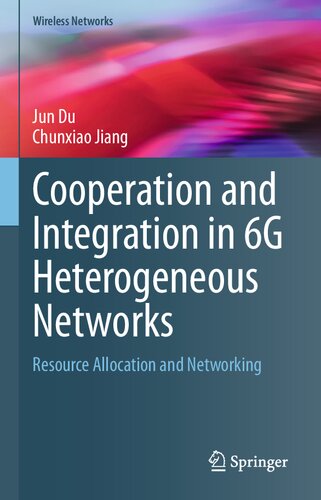

Most ebook files are in PDF format, so you can easily read them using various software such as Foxit Reader or directly on the Google Chrome browser.
Some ebook files are released by publishers in other formats such as .awz, .mobi, .epub, .fb2, etc. You may need to install specific software to read these formats on mobile/PC, such as Calibre.
Please read the tutorial at this link: https://ebookbell.com/faq
We offer FREE conversion to the popular formats you request; however, this may take some time. Therefore, right after payment, please email us, and we will try to provide the service as quickly as possible.
For some exceptional file formats or broken links (if any), please refrain from opening any disputes. Instead, email us first, and we will try to assist within a maximum of 6 hours.
EbookBell Team

4.0
6 reviewsTo provide ubiquitous and various services, 6G networks tend to be more comprehensive and multidimensional by integrating current terrestrial networks with space-/air-based information networks and marine information networks; then, heterogeneous network resources, as well as different types of users and data, will be also integrated. Driven by the exponentially growing demands of multimedia data traffic and computation-heavy applications, 6G heterogenous networks are expected to achieve a high QoS with ultra-reliability and low latency.
The book addresses a range of technical issues in cooperative resource allocation and information sharing for the future 6G heterogenous networks, from the terrestrial ultra-dense networks and space-based networks to the integrated satellite-terrestrial networks, as well as introducing the effects of cooperative behavior among mobile users on increasing capacity, trustworthiness and privacy. For the cooperative transmission in heterogeneous networks, the authors commence with the traffic offloading problems in terrestrial ultra-dense networks, and the cognitive and cooperative mechanisms in heterogeneous space-based networks, the stability analysis of which is also provided. Moreover, for the cooperative transmission in integrated satellite-terrestrial networks, the authors present a pair of dynamic and adaptive resource allocation strategies for traffic offloading, cooperative beamforming and traffic prediction based cooperative transmission. Later, the authors discuss the cooperative computation and caching resource allocation in heterogeneous networks, with the highlight of providing our current studies on the game theory, auction theory and deep reinforcement learning based approaches. Meanwhile, the authors introduce the cooperative resource and information sharing among users, in which capacity oriented-, trustworthiness oriented-, and privacy oriented cooperative mechanisms are investigated. Finally, the conclusion